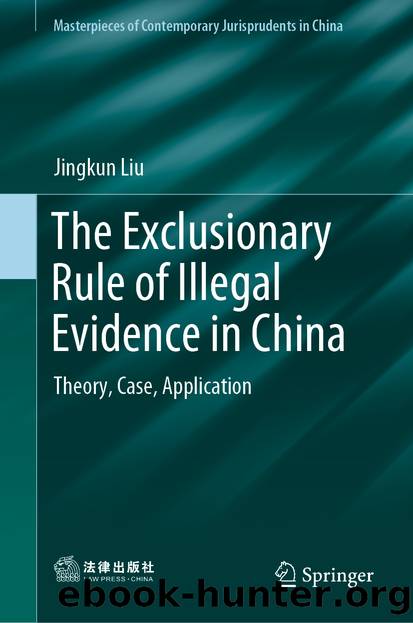The Exclusionary Rule of Illegal Evidence in China by Jingkun Liu

Author:Jingkun Liu
Language: eng
Format: epub
ISBN: 9789811337567
Publisher: Springer Singapore
4.4.6.3 Disputed Evidence Shall not Be Read and Cross-Examined Before Decision on the Legality of Evidence Is Made by the Court
With regard to the motion filed by the defense to exclude illegal evidence, if the court has no doubt about the legality of evidence and decides not to initiate special investigation procedure, such evidence can be read and cross-examined. If the court decides to initiate special investigation procedure, then, no matter through prior investigation in court or combined investigation before the end of court investigation, the dispute over the legality of evidence must be resolved before relevant evidence can be read and cross-examined. In some cases, when the defense files a motion to exclude illegal evidence, and the court conducts investigation on the legality of evidence, it is wrong for the prosecutor to read disputed evidence directly.
Some argue that relevant evidence has to be read in order to verify the legality of the evidence. This opinion confuses the special investigation on the legality of evidence and the court investigation on the fact of the case. Taking confession as an example, when investigating the legality of confession, the prosecutor can present interrogation record and play videotape recording of the interrogation. The so-called âpresentâ means external examination of the interrogation record, and the so-called âplayâ means playing the videotape recording of the investigation regarding specific period of time. By contrast, if the court holds that the confession is lawfully obtained, it can be read and cross-examined. Here, âread and cross-examinedâ refers to the substantial content of the interrogation record or videotape recording of the interrogation.
Furthermore, if the legality of evidence is investigated before the end of court investigation under certain circumstances in order to prevent excessive delay of the trial, it shall be mentioned not to confuse the legality and truthfulness of disputed evidence. Because the Criminal Procedural Law resumes the system of transferring case files along with the prosecution, the judge may have reviewed all the evidential materials before trial. In such circumstance, if it is discovered that relevant evidence is illegally obtained, the court shall not refuse to exclude illegal evidence because it is truthful and can be corroborated by other evidence in the case. It shall be emphasized that the exclusionary rule aims to solve the problem of admissibility, rather than the probative value. Even though illegal testimonial or material evidence is truthful, as long as it is collected by illegal means, it shall be excluded.
Download
This site does not store any files on its server. We only index and link to content provided by other sites. Please contact the content providers to delete copyright contents if any and email us, we'll remove relevant links or contents immediately.
The Borden Murders by Sarah Miller(4313)
The Secret Barrister by The Secret Barrister(3696)
Police Exams Prep 2018-2019 by Kaplan Test Prep(2540)
Coroner's Journal by Louis Cataldie(2476)
The Splendid and the Vile by Erik Larson(2458)
Terrorist Cop by Mordecai Dzikansky & ROBERT SLATER(2072)
A Colony in a Nation by Chris Hayes(1927)
My Dark Places by James Ellroy(1926)
The Art of Flight by unknow(1872)
Black Klansman by Ron Stallworth(1790)
Objection! by Nancy Grace(1778)
A Life of Crime by Harry Ognall(1728)
The New Jim Crow by Michelle Alexander(1702)
Anatomy of Injustice by Raymond Bonner(1664)
American Prison by Shane Bauer(1656)
Invisible Women by Caroline Criado Perez;(1640)
Whoever Fights Monsters by Robert K. Ressler(1616)
Obsession (The Volkov Mafia Series Book 1) by S.E Foster(1575)
A is for Arsenic: The Poisons of Agatha Christie (Bloomsbury Sigma) by Kathryn Harkup(1538)
